Guest blogged by Ernest A. Canning
 When the new Congressional map was first produced by the non-partisan California Citizens Redistricting Commission, CA's GOP leadership expressed concern that it might lose up to five of its nineteen Congressional seats in the bargain.
When the new Congressional map was first produced by the non-partisan California Citizens Redistricting Commission, CA's GOP leadership expressed concern that it might lose up to five of its nineteen Congressional seats in the bargain.
Although its legal challenge to redistricting was rejected by the CA Supreme Court (a majority of whom were appointed by Republican Governors), the June 5, 2012 "Top Two" open primary (aka "Cajun Primary") contests, approved by a 2010 ballot initiative, may allow for GOP pickups, even in areas where Republican voters represent the minority.
One example is in the newly created CA-26 Congressional District, which reveals a potential formula by which the GOP can overcome adverse party registration numbers --- in that case, 40% (D), 36% (R), 19% (I) --- in order to seize a Congressional seat.
Because four Democrats are competing in the CA-26 primary, long suffering progressives, including this writer, who had previously been forced to cast a protest vote in the now defunct, heavily gerrymandered CA-24 District of the outgoing, extreme right-wing Republican Elton Gallegly, may awake on June 6 to the reality that, come next November, they will be forced to choose between a 'Tea Party' Republican and a County Supervisor who "changed her voter registration...from Republican to 'no party preference' in preparation for her bid for Congress"...
Anti-democratic 'Cajun Primary'
In June 2010 CA voters enacted Proposition 14, an amendment of the state's constitution which forces all party-affiliated and non-party affiliated candidates to run in a single primary election, with the two candidates receiving the greatest number of votes then facing off in the general election or run-off.
At the time it passed, then CA Gov. Arnold Schwarzenegger (R) touted the Prop 14 "open primary" (also known as the "Cajun Primary") as a means to assure democratic accountability. The philandering actor-turned-governor said it would eliminate "the ideological traffic jam in Sacramento."
But, according to Richard Derham, a Research Fellow of the Washington Policy Center, the "Cajun Primary" was developed in the South, at a time when it was dominated by a one-party system of segregationist Democrats. It was not meant, says Derham, to assure (small "d") democratic accountability, but rather to eliminate "the influence of Republican and Black voters".
In California in 2012, the "Cajun Primary" system turns the same formula on its head in such a way that it may well come back to haunt the Democratic Party, long after they've shed their Dixiecrat roots.
The upcoming CA-26 primary underscores the undemocratic potential of such a primary system. In a three-way race, all other things being equal, one would anticipate 40% to a Democrat, 36% to the Republican and the balance perhaps going to a genuine independent candidate. But here, the 40% for Democrats will be carved up amongst four Democratic candidates running in the same race with one GOP candidate openly running as a Republican and another who had been a Republican until she decided to shed the party label for the upcoming primary to run as an ostensible "Independent."
Stealth Republican?
The CA-26 race provides a paradigm example of how a "Cajun Primary" can facilitate a seizure of power by a minority party through the use of a stealth Republican, who deceptively dons an "Independent" label.
During a recent Cal Lutheran University debate (see video segment below), Ventura County Supervisor Linda Parks was quick to point out that, while she had been a registered Republican for sixteen years until days prior to the candidate filing deadline, she was a registered Democrat prior to that.
Parks' forays into politics began with stints on the Planning Commission, City Council and eventually as Mayor of Thousand Oaks --- a Republican enclave in which both Parks and the author reside. While those offices are ostensibly non-partisan, context at least suggests that Parks is an opportunist who changes party affiliation for political benefit --- first when she decided to run for local office and now, again, in seeking a seat in the U.S. House of Representatives.
While most political ads suffer from a substance deficit, Parks' paid-for ad (see second video below) is striking for an almost total failure to so much as hint at her positions on issues of substance. It embodies Parks' two principle talking points: that she won't accept special interest monies and that partisan gridlock is counterproductive.
As can be seen in the CLU debate segment, Parks' critique of partisanship drew a sharp retort form CA Assembly Member Julia Brownley (D), author of the CA Disclose Act, which mandates that political ads in CA must disclose the source of their funding. Brownley, Parks' chief Democratic opponent, who has been endorsed by MoveOn.org, as well as the Democratic National Party, said:
Democratic Party mailers and an online Parks opponent note that Parks refuses to say whether she would caucus with the Democrats or Republicans, if elected; that she refuses to renounce the Ryan budget; that she responded to questions about raising taxes on millionaires and billionaires by saying that she would not raise taxes on anyone, and that she touted the GOP talking point about the need to do "something about the Social Security shortfall."
"Shortfall?" According to the Congressional Budget Office, per Sen. Bernie Sanders (I-VT), "Social Security has a $2.6 trillion surplus." Sanders introduced legislation which, by attaching Social Security withholding to wages in excess of $250,000, would insure that Social Security will be solvent for the next 75 years.
Nonetheless, Parks' posture as an "independent", at least as voters will see her name on the ballot, may well assure that a Democratic-leaning electorate is forced to choose between two Republicans this November.
Ideal democratic solution: Repeal the 'Cajun Primary'!
The result of the deception is that the leading admitted-Republican in the race, 'Tea Party'-supported Tony Strickland is likely to take one of the two top spots, while the second could go to Parks, the stealth Republican.
One could argue that there is an opportunity for the Democratic Party, as well as the GOP, to take similar advantage of the "Top Two" open primary system by running only one candidate who is identified as a Democrat, while adding in one or more stealth Democrats who formally run as "independents" to take the second slot in the "Top Two". But, unlike the GOP, which is generally run from the top-down, where a candidate is chosen by the establishment (in this case, an "establishment" now firmly in the grips of radical "Tea Party" billionaires like the Koch brothers) the Democratic Party includes bottom up organizations and candidates who are not always in sync with the mainstream Democratic establishment.
Absent the adoption of a potentially cumbersome and expensive caucus system to determine one candidate to run as a Democrat in each primary, the Democratic Party actually needs a primary to select their candidate. A Democratic Party that aspires towards the achievement of a true democratic society must eschew deception and the authoritarian limits to electoral choice brought on (or perhaps more appropriately, encouraged) by the "Cajun Primary." The Republican Party ought do the same. But, of course, they will not, the 21st Century GOP has proven, time and again, its willingness to place politics and power over true democracy.
For citizens in other states, the CA-26 'Cajun Primary' offers a valuable lesson as to why they should reject calls to adopt a "Top Two" open primary system. The citizens of California made a grave error in adopting it; an error which can best be remedied by a voter-approved repeal of the Proposition 14 "Top Two" open primary system in the Golden State.
Segment from a recent CA-26 debate at Cal Lutheran University follows...
"Independent" Linda Parks' campaign video follows...
Democrat Julia Brownley campaign video follows...
Ernest A. Canning has been an active member of the California state bar since 1977. Mr. Canning has received both undergraduate and graduate degrees in political science as well as a juris doctor. He is also a Vietnam vet (4th Infantry, Central Highlands 1968). Follow him on Twitter: @Cann4ing.
[Image: Shutterstock/Savelyev]


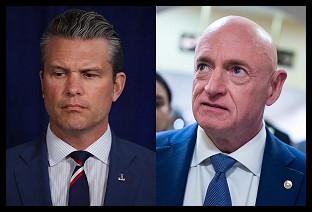 Court Blocks Hegseth Censure of Sen. Mark Kelly
Court Blocks Hegseth Censure of Sen. Mark Kelly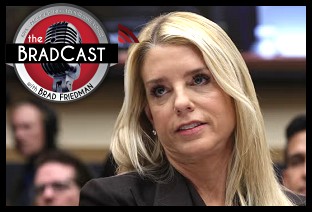 Harpy Tantrums, Legal Losses, Election Fails, Retreating ICE and Other Hopeful Signs: 'BradCast' 2/12/26
Harpy Tantrums, Legal Losses, Election Fails, Retreating ICE and Other Hopeful Signs: 'BradCast' 2/12/26 'Green News Report' 2/12/26
'Green News Report' 2/12/26
 'Let Kids with Asthma Suffer': Trump to Reverse EPA's Landmark 'Endangerment Finding': 'BradCast' 2/11/26
'Let Kids with Asthma Suffer': Trump to Reverse EPA's Landmark 'Endangerment Finding': 'BradCast' 2/11/26 Trump's Presidency Now About Little More Than Racism, Corruption, Culture War Nonsense: 'BradCast' 2/10/26
Trump's Presidency Now About Little More Than Racism, Corruption, Culture War Nonsense: 'BradCast' 2/10/26 'Green News Report' 2/10/26
'Green News Report' 2/10/26 About Trump's FBI Raid of the Fulton County, GA Elections Warehouse: 'BradCast' 2/9/26
About Trump's FBI Raid of the Fulton County, GA Elections Warehouse: 'BradCast' 2/9/26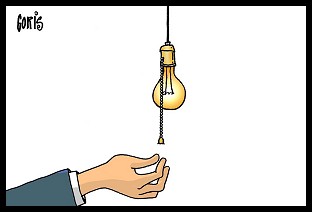 Sunday 'Dead in Darkness' Toons
Sunday 'Dead in Darkness' Toons 'New START' Treaty Allowed to End Amid New World Disorder: 'BradCast' 2/5/26
'New START' Treaty Allowed to End Amid New World Disorder: 'BradCast' 2/5/26 'Green News Report' 2/5/26
'Green News Report' 2/5/26 Trump Turns 'War on Terror' Tools Against Domestic Political Foes: 'BradCast' 2/4/26
Trump Turns 'War on Terror' Tools Against Domestic Political Foes: 'BradCast' 2/4/26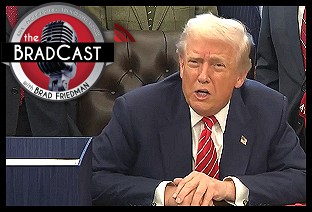 Losing Legally and Politically, Trump Threatens to 'Nationalize' Elections: 'BradCast' 2/3/26
Losing Legally and Politically, Trump Threatens to 'Nationalize' Elections: 'BradCast' 2/3/26 'Green News Report' 2/3/26
'Green News Report' 2/3/26 Bad and Good Bunnies, and an Electoral Shock in Deep 'Red' TX: 'BradCast' 2/2/26
Bad and Good Bunnies, and an Electoral Shock in Deep 'Red' TX: 'BradCast' 2/2/26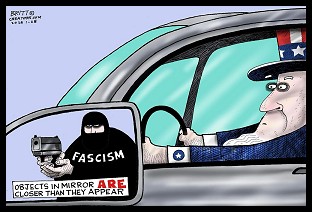 Sunday 'Mirror, Mirror' Toons
Sunday 'Mirror, Mirror' Toons 'Green News Report' 1/29/26
'Green News Report' 1/29/26 It's About Elections and the Windmills of His Mind: 'BradCast' 1/29/26
It's About Elections and the Windmills of His Mind: 'BradCast' 1/29/26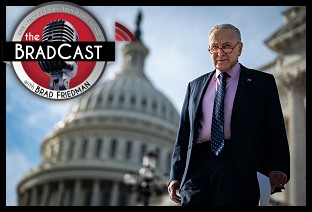 Govt Shutdown Over ICE Funding Near Certain This Weekend: 'BradCast' 1/28/26
Govt Shutdown Over ICE Funding Near Certain This Weekend: 'BradCast' 1/28/26 Trump Blinks, Bovino Out, MN Op Falters, Persists as Midterms Loom: 'BradCast' 1/27
Trump Blinks, Bovino Out, MN Op Falters, Persists as Midterms Loom: 'BradCast' 1/27  The ICE Murder of ICU Nurse Alex Pretti and the Heroes of Mpls: 'BradCast' 1/26/26
The ICE Murder of ICU Nurse Alex Pretti and the Heroes of Mpls: 'BradCast' 1/26/26  The BRAD BLOG: 22 Years and Still Counting
The BRAD BLOG: 22 Years and Still Counting Mr. Smith Testifies (Publicly) in Washington: 'BradCast' 1/22/26
Mr. Smith Testifies (Publicly) in Washington: 'BradCast' 1/22/26 World Turning Against Self-Destructing U.S. Under Trump: 'BradCast' 1/21/26
World Turning Against Self-Destructing U.S. Under Trump: 'BradCast' 1/21/26 Trump Waste, Fraud, Abuse on Voting, at DOJ, by DOGE: 'BradCast' 1/20/26
Trump Waste, Fraud, Abuse on Voting, at DOJ, by DOGE: 'BradCast' 1/20/26
 VA GOP VOTER REG FRAUDSTER OFF HOOK
VA GOP VOTER REG FRAUDSTER OFF HOOK Criminal GOP Voter Registration Fraud Probe Expanding in VA
Criminal GOP Voter Registration Fraud Probe Expanding in VA DOJ PROBE SOUGHT AFTER VA ARREST
DOJ PROBE SOUGHT AFTER VA ARREST Arrest in VA: GOP Voter Reg Scandal Widens
Arrest in VA: GOP Voter Reg Scandal Widens ALL TOGETHER: ROVE, SPROUL, KOCHS, RNC
ALL TOGETHER: ROVE, SPROUL, KOCHS, RNC LATimes: RNC's 'Fired' Sproul Working for Repubs in 'as Many as 30 States'
LATimes: RNC's 'Fired' Sproul Working for Repubs in 'as Many as 30 States' 'Fired' Sproul Group 'Cloned', Still Working for Republicans in At Least 10 States
'Fired' Sproul Group 'Cloned', Still Working for Republicans in At Least 10 States FINALLY: FOX ON GOP REG FRAUD SCANDAL
FINALLY: FOX ON GOP REG FRAUD SCANDAL COLORADO FOLLOWS FLORIDA WITH GOP CRIMINAL INVESTIGATION
COLORADO FOLLOWS FLORIDA WITH GOP CRIMINAL INVESTIGATION CRIMINAL PROBE LAUNCHED INTO GOP VOTER REGISTRATION FRAUD SCANDAL IN FL
CRIMINAL PROBE LAUNCHED INTO GOP VOTER REGISTRATION FRAUD SCANDAL IN FL Brad Breaks PA Photo ID & GOP Registration Fraud Scandal News on Hartmann TV
Brad Breaks PA Photo ID & GOP Registration Fraud Scandal News on Hartmann TV  CAUGHT ON TAPE: COORDINATED NATIONWIDE GOP VOTER REG SCAM
CAUGHT ON TAPE: COORDINATED NATIONWIDE GOP VOTER REG SCAM CRIMINAL ELECTION FRAUD COMPLAINT FILED AGAINST GOP 'FRAUD' FIRM
CRIMINAL ELECTION FRAUD COMPLAINT FILED AGAINST GOP 'FRAUD' FIRM RICK SCOTT GETS ROLLED IN GOP REGISTRATION FRAUD SCANDAL
RICK SCOTT GETS ROLLED IN GOP REGISTRATION FRAUD SCANDAL VIDEO: Brad Breaks GOP Reg Fraud Scandal on Hartmann TV
VIDEO: Brad Breaks GOP Reg Fraud Scandal on Hartmann TV RNC FIRES NATIONAL VOTER REGISTRATION FIRM FOR FRAUD
RNC FIRES NATIONAL VOTER REGISTRATION FIRM FOR FRAUD EXCLUSIVE: Intvw w/ FL Official Who First Discovered GOP Reg Fraud
EXCLUSIVE: Intvw w/ FL Official Who First Discovered GOP Reg Fraud GOP REGISTRATION FRAUD FOUND IN FL
GOP REGISTRATION FRAUD FOUND IN FL

































